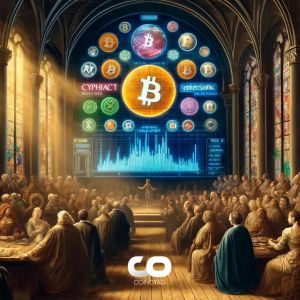Crypto Industry Leaders Flock to Exclusive D.C. Club
6 min read
Washington, D.C. is increasingly becoming a critical battleground for the future of the cryptocurrency industry. As regulatory discussions heat up and policy frameworks are debated, the importance of having a presence and building connections within the nation’s capital cannot be overstated. Against this backdrop, news has emerged that a new, highly exclusive private club is attracting significant attention from prominent figures in the crypto world, signaling a growing desire among Crypto Industry Leaders to engage directly with the heart of U.S. power. What is the Executive Branch Club? The buzz centers around the Executive Branch Club , a new members-only establishment co-founded by Donald Trump Jr., the eldest son of former U.S. President Donald Trump. Positioned in the historic Georgetown neighborhood of Washington, D.C., this club isn’t your average social spot. It’s designed specifically to cultivate an elite network. Founders: Co-founded by Donald Trump Jr. Location: Georgetown, Washington, D.C. Opening: Expected to open its doors very soon. Target Audience: Wealthy CEOs, influential tech founders, and key policy experts. Membership: Reportedly carries a hefty $500,000 initiation fee. Exclusivity: Features a significant waiting list, underscoring its high demand and selective nature. The club’s stated aim is to provide a curated environment for influential individuals to connect, share insights, and potentially shape discussions on important issues ranging from technology and finance to policy and politics. Why Are Crypto Industry Leaders Interested in D.C. Networking? The presence of prominent figures from the digital asset space at the Executive Branch Club highlights a significant shift. For years, the crypto industry largely operated outside traditional financial and political spheres. However, as cryptocurrencies and blockchain technology have grown in prominence and complexity, so too has the scrutiny from regulators and policymakers. Engaging in Crypto Networking in Washington, D.C. is no longer optional; it’s becoming essential. Here’s why: Policy Influence: Decisions made in D.C. regarding regulation, taxation, and legal status directly impact the future of crypto businesses and investments. Networking allows industry leaders to share their perspectives and potentially influence these outcomes. Information Gathering: Being close to the policy-making process provides invaluable insights into potential regulatory changes, allowing companies and investors to prepare proactively. Building Relationships: Establishing personal connections with policymakers, their staff, and other influential figures can open doors for dialogue and education about complex crypto topics. Legitimacy and Mainstreaming: The active participation of crypto figures in traditional D.C. power circles helps to legitimize the industry and integrate it further into the mainstream financial and political landscape. The club setting offers a less formal, yet highly effective, environment for these critical interactions compared to official meetings or public forums. Prominent Crypto and Tech Figures Joining the Fold The report specifically names several high-profile individuals with deep ties to the tech and crypto worlds who are reportedly drawn to the Executive Branch Club . These include: David Sacks: A prominent venture capitalist (Craft Ventures), co-founder of PayPal, and host of the popular All-In Podcast. Sacks has become an increasingly vocal commentator on technology, politics, and policy, often expressing views relevant to the future of innovation and regulation. His involvement signals the club’s appeal to the tech investment elite. Chamath Palihapitiya: Another well-known venture capitalist (Social Capital), former Facebook executive, and co-host of the All-In Podcast alongside Sacks. Palihapitiya is known for his outspoken views on various industries, including technology and finance, and his interest aligns with the club’s focus on connecting influential figures across sectors. Tyler and Cameron Winklevoss: Co-founders of the Gemini cryptocurrency exchange and early Bitcoin investors. The Winklevoss twins have been active advocates for clear cryptocurrency regulation and have engaged with policymakers in the past. Their potential membership underscores the direct interest of major crypto platform operators in D.C. policy discussions. The presence of such heavyweights suggests that the club is successfully attracting the very demographic it targets – individuals with significant capital, influence, and a vested interest in the intersection of technology, finance, and government policy. Their participation in Crypto Networking within this exclusive environment could have ripple effects across the industry. The Growing Importance of D.C. Crypto Policy For anyone involved in digital assets, understanding and engaging with D.C. Crypto Policy is paramount. The regulatory landscape for cryptocurrencies in the United States is still evolving, with various government agencies – including the SEC, CFTC, Treasury, and Congress – grappling with how to classify, regulate, and oversee this new asset class. Key policy debates currently underway include: Whether specific cryptocurrencies are securities or commodities. How to regulate stablecoins. Taxation rules for crypto transactions and investments. Consumer protection and market integrity concerns. The potential for a U.S. Central Bank Digital Currency (CBDC). Exclusive clubs like the Executive Branch provide an informal venue where industry leaders can discuss these complex issues directly with policymakers and other influential figures, potentially shaping narratives and fostering a better understanding of the technology and its potential. Benefits of Exclusive Networking for Crypto Leaders What specific advantages might Crypto Industry Leaders gain from membership in such a club? Direct Access: Unparalleled opportunity to interact directly with policymakers, legislative staff, and other figures shaping the regulatory environment. Informal Lobbying: The ability to informally advocate for policies favorable to the crypto industry and educate influential individuals on the nuances of digital assets. Strategic Alliances: Opportunity to build relationships with leaders from traditional finance, tech, and other sectors, fostering potential partnerships and collaborative efforts on policy issues. Intelligence Gathering: Gaining early insights into policy thinking and potential regulatory directions before they become public. Peer Networking: Connecting with other top-tier leaders facing similar challenges and opportunities in the rapidly evolving tech and crypto space. While traditional lobbying efforts and public forums remain crucial, these private networks offer a complementary avenue for influence and relationship building. Potential Challenges and Criticisms While the benefits for Crypto Networking are clear, the existence of such exclusive clubs also raises questions and potential criticisms: Elitism: The high membership fee naturally restricts access to a very small, wealthy group, potentially reinforcing perceptions of D.C. influence being available only to the privileged few. Transparency Concerns: Discussions held in private clubs are not subject to the same transparency requirements as public meetings or official lobbying disclosures. Regulatory Capture Risk: Critics might argue that such close ties between industry leaders and policymakers could lead to policies that favor specific interests over broader public good or fair competition. Optics: For an industry often championing decentralization and open access, associating with highly centralized, exclusive power structures might present an optics challenge. Navigating these perceptions while effectively engaging in D.C. remains a key challenge for the industry. Actionable Insights for the Crypto Community What does this development mean for the broader crypto community, including investors, developers, and smaller businesses? Stay Informed: Recognize that policy decisions in D.C. are increasingly influenced by direct engagement from industry leaders. Pay attention to policy debates and proposed legislation. Support Advocacy Groups: While exclusive clubs cater to the elite, supporting broader crypto advocacy groups and lobbying efforts helps ensure a wider range of voices are heard in Washington. Understand the Landscape: Appreciate that the future of crypto is being shaped not just by technology and markets, but also by political and regulatory factors. Consider Local Engagement: While D.C. is central, state-level regulations are also important. Engage with policymakers at all levels where possible. The involvement of Donald Trump Jr. in co-founding a club that attracts these figures adds a layer of political intrigue and highlights the increasing entanglement of crypto with mainstream political dynamics. Conclusion: Crypto’s Expanding Footprint in D.C. The emergence of the Executive Branch Club as a potential hub for prominent Crypto Industry Leaders marks a significant moment. It underscores the industry’s maturation and its recognition of the critical importance of engaging with the political and policy-making apparatus in Washington, D.C. While the exclusive nature of such a venue might spark debate, the underlying trend is clear: the crypto world is actively seeking to build relationships and influence discussions where its future is being decided. As the club opens its doors, its role in shaping D.C. Crypto Policy and fostering elite Crypto Networking will be closely watched, offering a fascinating glimpse into the evolving intersection of technology, finance, and power in the nation’s capital. To learn more about the latest crypto policy trends and how they impact the market, explore our article on key developments shaping crypto regulation and politics .

Source: Bitcoin World


